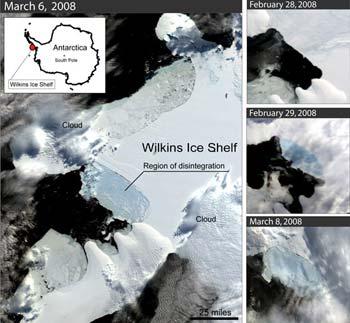Source: Xinhua
04-05-2009 15:24
Special Report: Tech MaxWASHINGTON, April 3 (Xinhua) -- One ice shelf in Antarctica has completely disappeared and another two have lost massive sections, as glaciers there are melting more rapidly than previously known due to global warming, according to two separate studies on Friday.
 |
| Scientists are citing "rapid climate change in a fast-warming region of Antarctica" as the cause of an initial collapse of the Wilkins Ice Shelf.(File photo) |
The U.S. Geological Survey (USGS) said in a report prepared in collaboration with the British Antarctic Survey that the Wordie Ice Shelf, which has been retreating in the past 40 years, is completely gone.
Moreover, the northern part of the Larsen Ice Shelf no longer exists, the USGS said, adding that more than 8,500 sq km have broken off from the Larsen Ice Shelf since 1986.
"The rapid retreat of glaciers there demonstrates once again the profound effects our planet is already experiencing - more rapidly than previously known -- as a consequence of climate change," U.S. Interior Secretary Ken Salazar said in a statement.
In a second study, images captured by Envisat, the European Space Agency's (ESA) environmental satellite, show shat the Wilkins Ice Shelf is at risk of partly breaking away from the Antarctic Peninsula as the ice bridge that connects it to Charcot and Latady Islands looks set to collapse.
New rifts are quickly expanding along the ice bridge, resulting in a large block of ice breaking away, the ESA said in a statement, adding that last year saw the ice loss of about 1800 sq km from Wilkins, or about 14 percent of its size.
"Scientists are currently investigating the reasons and processes of the recent ice shelf break-ups and whether the current situation is linked to the extraordinary warming during the past 50 years, in which the Antarctic Peninsula has warmed by 2.5 degrees celsius - far more than the global average," said the ESA.
In another study published in the journal Geophysical Letters, the National Oceanic and Atmospheric Administration reported that ice is melting much more rapidly than expected in the Arctic as well, based on new computer analyses and recent ice measurements.
-- Click for more news in Tech Max >>
Editor:Yang Jie
